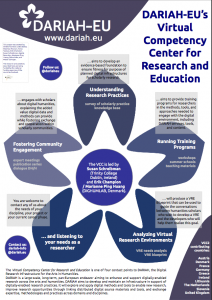You are viewing entries marked 'DH2013 Poster Gallery'.
Poster
Abstract
Wentworth Institute of Technology (WIT), an independent, co-educational, technical design and engineering college located in Boston, Massachusetts, offers a comprehensive interdisciplinary, project-based education that integrates classroom, laboratory, studio, cooperative and experiential learning.
(Read more)

DH2013 Poster from DARIAH-EU, a European initiative to support digital research in the arts and humanities.
“creating tools for individuals with disabilities improves digital environments for all users.”
Cory Bohon, Jennifer Guiliano, James Smith, George Williams and Amanda Visconti
(Read more)
Poster
Abstract
A Computational Perspective on Allusion
Most literary allusion, the deliberate evocation by one text of a passage in another, is based upon text reuse. Yet most instances of textual similarity are not meaningful literary allusions.
(Read more)
Poster
Abstract
“Making the Digital Humanities More Open,” a NEH ODH Digital Humanities Start-Up Grant Project, is creating a free and easy-to-use tool that enables end-users with a variety of disabilities and abilities to access online humanities resources, allowing digital humanities projects to share the products of their text-based projects with this often-neglected audience of readers.
(Read more)
Poster
Abstract
The recent development of Web 2.0 technologies has been implemented in many applications with an emphasis on user contribution, active user participation, and harnessing of collective intelligence. In particular, interest has grown in the use of tagging, as tagging allows users to add their own keywords or tags to online documents and images so that they can organize resources for themselves, share them with others, and find resources that others have tagged.
(Read more)

